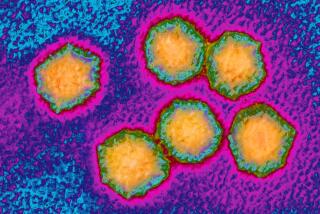Your best shot at fighting hepatitis
- Share via
With the nation’s largest-ever hepatitis A outbreak traced to a restaurant in Pennsylvania, and recent incidents reported in three other states, many people are wondering how they can protect themselves and their families from the contagious liver disease.
There’s only one surefire way: Get vaccinated.
“Why be exposed to a disease for which there is a preventive measure?” says Dr. Laurene Mascola, chief of acute communicable disease control for the L.A. County health department.
Hepatitis A is caused by a virus spread through feces, poor hygiene by food handlers, contaminated food or water or sometimes sexual contact. It typically develops within a month of exposure and there is no treatment but rest. Symptoms include yellowing of the skin (jaundice), fatigue, abdominal pain, loss of appetite, nausea, diarrhea and fever.
In the last few years, an increased number of local outbreaks have been traced to foods contaminated before they reach restaurants, prompting efforts by some states and organizations such as the American Academy of Pediatrics and the American Academy of Family Physicians to encourage widespread immunization. Their campaigns have targeted children because they’re the biggest spreaders, often going symptom-free or seeming to have the flu while passing the virus to parents, teachers and others.
The infection can sideline adults for a month, usually without long-lasting effects. It can be extremely serious in those with chronic liver disease or a compromised immune system, and kills about 100 people a year.
Eleven states, including California, were designated as high-risk areas by a federal advisory panel in 1999. These states recommend, but don’t require, childhood vaccination against hepatitis A. Disease rates in those states have dropped 83% since vaccination recommendations were issued, according to the federal Centers for Disease Control and Prevention.
The high-risk designation made those states eligible for free vaccines from the federal government. California distributes hundreds of thousands of free doses annually through public clinics and to low-income kids through the Vaccines for Children program. Many health insurers in high-risk states cover the cost as well. Private doctors typically charge $45 to $80 for each of the two injections given six months apart.
Most California doctors and clinics vaccinate youngsters at age 2. Parents who think their children haven’t been vaccinated are encouraged to ask doctors about the shots.
Although the vaccine is considered safe, the state decided against mandating vaccinations for several reasons, said Celia Woodfill, an epidemiologist with the state health department’s immunization branch. The requirement would place an extra administrative cost on already financially strapped schools, which would need to check vaccination records for incoming kindergarteners. Also, parents and insurers would have to pay for extra doctor visits to get the injections.
Then there’s the issue of overall risk. Unlike flu outbreaks, which occur every year and kill tens of thousands nationwide, hepatitis A outbreaks are relatively uncommon.
Another deterrent to a mandated vaccine, Woodfill said, is reluctance about adding yet another shot to the 21 vaccinations that are required for children by age 2. “We thought the vaccine program is working well enough without having to mandate it,” she said, adding that state health officials would consider requiring hepatitis A vaccinations if they could be included in a combination vaccine.
When California began recommending the vaccine in 1999, its hepatitis rate was among the highest in the nation, driven partly by travel to and from regions where the disease is endemic, including Latin America, Asia and Africa.
Today, the rate is dramatically lower, said Woodfill. The vaccinations have dropped childhood rates of hepatitis A from 30 cases per 100,000 children to 1.5 per 100,000 as of Oct. 7, the most recent statistics available.
Among adults, the rate dropped from 18 per 100,000 to 2.3 per 100,000, Woodfill said.
Woodfill said there were 1,450 cases in 2002; this year, as of Oct. 7, there have been 700.
There is no data on how many people are being vaccinated nationally or in California, although Woodfill said a CDC-funded national immunization survey is supposed to collect that information this year. “What we know is that we’re shipping out a lot of vaccine and the disease incidence has gone through the floor, so something is working,” she said.
The vaccine is nearly 100% effective and an estimated 65% of adults have been exposed to hepatitis A by the age of 50 and so are immune. The remaining adults are vulnerable to an outbreak. The Pennsylvania cases, numbering nearly 600, including three deaths, occurred among patrons of a Chi-Chi’s Mexican restaurant outside Pittsburgh.
The outbreak in Pennsylvania, like those in North Carolina, Georgia and Tennessee in September, has been traced to eating green onions, also called scallions.
Tennessee, Georgia and Pennsylvania officials traced the contaminated green onions to Mexico. Several restaurants around the country, including Chi-Chi’s and Taco Bell, have stopped using green onions in their dishes or as a garnish.
The Food and Drug Administration last week halted imports of Mexican green onions and advised people to thoroughly cook green onions to kill any hepatitis virus. When eating at restaurants and delis, the FDA suggests checking whether any foods contain raw or lightly cooked green onions.
Eliminating one implicated food doesn’t get to the heart of the problem: vulnerability to hepatitis A from other sources.
If you suspect you’ve been exposed to the virus, an injection of immune globulin, made from antibodies to the virus, can provide protection if taken within two weeks.
Several thousand Los Angeles school children were inoculated preventively with gamma globulin in 1997 after Mexican strawberries, improperly supplied to the federal school lunch program, sickened more than 200 children in Michigan, Maine and Wisconsin.
Mascola advocates adult vaccination because coming down with hepatitis A “is a terrible thing. You can get very sick for a month or two and be off work.” Plus, she says, avoiding raw fruits and vegetables prevents you from getting the good nutrients they contain.
More to Read
Sign up for Essential California
The most important California stories and recommendations in your inbox every morning.
You may occasionally receive promotional content from the Los Angeles Times.










